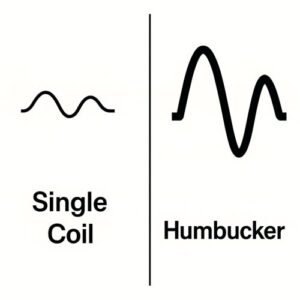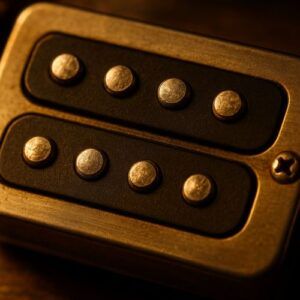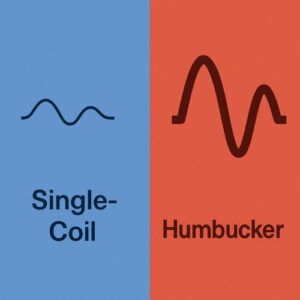When building your own electric guitar kit, there’s one component that will shape your sound more than any other: the pickup. These humble-looking devices sit beneath your strings and translate vibration into electric signal — and ultimately into music. But not all pickups are created equal. In this guide — Understanding Humbucker Vs Single Coil Pickups In Kits — we’ll break down how each pickup works, what makes them sound different, and how to choose the right one for your playing style and DIY build.

The Dynamics of Single Coil Pickups
What Are Single Coil Pickups?
Single coil pickups are the OGs of electric guitar tone. Designed with a single magnet wrapped in a fine copper wire coil, these pickups deliver a crisp, articulate tone that cuts through mixes with ease. You’ll typically find them in Strat-style or Telecaster-style guitars — icons of the rock, country, and blues scenes.
Benefits of Using Single Coil Pickups
![]()
- Bright and clear tones: Great for clean playing, funk, and rhythm work.
- Responsive to playing dynamics: Pick softer and you’ll get sparkle; dig in and the sound gets snappy.
- Classic tone: Think Hendrix, Clapton (early years), and John Mayer.
These pickups are perfect if your style leans toward articulate lead lines or rhythm work with a chimey character.
Ideal Musical Styles for Single Coils
- Blues
- Funk
- Country
- Indie Rock
- Surf Rock

** Here’s a little transparency: Our website contains affiliate links. This means if you click and make a purchase, we may receive a small commission. Don’t worry, there’s no extra cost to you. It’s a simple way you can support our mission to bring you quality content.**
As an Amazon Associate, I earn from qualifying purchases.
Exploring the Disadvantages of Single Coil Pickups

No pickup design is perfect — and single coils have their quirks.
Background Noise and 60-Cycle Hum
Single coils are notorious for their hum. The 60-cycle hum is a byproduct of their design, making them susceptible to electromagnetic interference from amps, lights, and other electronics.
Limited Output and Distortion Capabilities
Because of their lower output, single coils aren’t always the best choice for high-gain distortion. You might find them lacking in punch or warmth when pushed hard in heavier styles like metal or hard rock.

Situations to Avoid Using Single Coils
- Playing in high-interference environments (e.g., clubs with lots of lighting gear)
- Heavy rock or metal genres where thick, compressed distortion is key
- If you’re looking for sustain-heavy lead tones
Understanding the Superiority of Humbuckers

The Birth of the Humbucker
Invented by Seth Lover in the 1950s for Gibson, the humbucker was created to solve the noise issue inherent in single coils. By combining two coils wired in opposite polarity, humbuckers “buck the hum”—hence the name.
Advantages of Humbucker Pickups
![]()
- Noise-canceling: Significantly reduces the hum.
- Warmer, fuller sound: Perfect for fat leads and rich chords.
- High output: Works better with distortion, overdrive, and effects pedals.
- Versatile across genres: From jazz to metal, humbuckers can handle it all.
Why Humbuckers Might “Sound Better”

Tone is subjective, but many guitarists feel humbuckers provide a more balanced, powerful tone—especially when driving amp gain stages. They excel in genres where clarity under distortion and a fuller low-end response are key.
Deciding Between Humbucker and Single Coil Pickups for Your Kit
Choosing between humbuckers and single coils isn’t just a matter of tone — it’s about how you play and what you play.

Key Comparison Factors
| Feature | Single Coil | Humbucker |
|---|---|---|
| Tone | Bright, crisp, articulate | Warm, thick, punchy |
| Noise | Prone to 60-cycle hum | Noise-cancelling |
| Output | Lower output | Higher output |
| Genre Fit | Blues, funk, indie | Rock, metal, jazz |
| Visual Aesthetic | Sleek and classic | Bold and chunky |
Personal Preference vs. Technical Specs
While specs matter, your ears and style should ultimately guide your decision. Play funk and blues with clean tones? Go single coil. Prefer chunky riffs or creamy leads? Try humbuckers.
What About Hybrid Setups?

Consider a HSS (humbucker-single-single) or HSH (humbucker-single-humbucker) configuration for maximum flexibility. Many guitar kits support these layouts, allowing you to blend brightness with brawn.
Final Thoughts…
If you’re building your own guitar kit, choosing between single coil and humbucker pickups is a defining decision in shaping your guitar’s voice. Single coils offer clarity and sparkle, while humbuckers deliver depth and muscle. Both have their place—and the best choice is the one that aligns with your sound.

For more help with electric guitar kit customization, check out these guides on How Pickup Position Affects Electric Guitar Tone In Kits, Best Pickups For Your Electric Guitar Kit: Choosing The Right Tone, and Essential Tools Every Electric Guitar Kit Builder Should Have.
There are 100’s of ways you can build a business around your passion for guitar building.
Check it out…



Great breakdown of the differences between humbuckers and single coils—this really helps DIY builders understand how pickups shape their sound! I love the suggestion of hybrid setups for versatility.
A couple of questions:
For someone new to building guitars, how challenging is it to wire an HSS or HSH configuration compared to a single type?
Do you have any favorite pickup brands or models you’d recommend for beginners aiming for that classic rock or blues tone?
Thanks so much! I’m glad the post helped clarify the humbucker vs. single coil differences. It’s such a foundational piece of shaping your guitar’s voice. Great questions! Wiring an HSS or HSH setup is definitely a bit more involved than sticking to one pickup type, mostly because of the added switching options and balancing output levels, but it’s totally doable with a good diagram and a bit of patience. As for pickup recommendations, for that classic rock/blues tone, I’m a big fan of Seymour Duncan’s JB/Jazz set or the SSL-1s for vintage single coil flavor. DiMarzio and Tonerider also have solid beginner-friendly options that don’t break the bank but still sound great!
Thank you again!
This article provides a solid foundation for understanding guitar pickups, but you could explore the nuances that go beyond a simple “either/or” choice. For instance, while it mentions hybrid setups, a more in-depth look at how the different pickup types interact in a single guitar—such as the tonal possibilities when combining a single coil in the middle position with a humbucker at the bridge—could be valuable.
Furthermore, you could be initiated on the role of other components, such as potentiometers (pots) and capacitors, in shaping the final sound of a guitar with a specific pickup type. A humbucker, for example, can sound different depending on the resistance value of the volume pot. Exploring these additional factors would give the reader a more complete understanding of how to achieve their desired tone, moving beyond just the pickup and into the entire electronic circuit.
Thank you for the thoughtful feedback! You’re absolutely right! There’s a lot more nuance once you start combining pickup types and exploring how electronics shape tone. Hybrid setups, like a middle single coil paired with a bridge humbucker, open up a ton of sonic possibilities, and the role of pots and capacitors can significantly affect how each pickup responds. I really appreciate your suggestions; diving deeper into these interactions is definitely something I can expand on to give builders a more complete understanding of tone shaping beyond just the pickups themselves.
Thanks again,
~Wayne
Really helpful breakdown of pickup differences! You explained the humbucker vs. single-coil comparison in a way that’s easy to understand without oversimplifying, and the audio examples are really useful for hearing the actual tonal differences!
As someone considering a first build, I’m curious – would you recommend starting with a standard single-coil or humbucker configuration before trying more advanced wiring options? Also, how much difference does pickup height really make in the final sound?
Great job making what could be a technical topic so approachable. The side-by-side comparisons of different music styles really drove the points home!
Thank you! I’m glad the humbucker vs. single-coil breakdown and audio examples helped make things clear. It’s always easier to understand tone when you can actually hear it. For a first build, I usually recommend starting with a standard single-coil or humbucker setup before diving into more advanced wiring. It keeps things simpler while you get comfortable with assembly and basic tone shaping.
As for pickup height, it really can make a noticeable difference in output and balance between strings, so it’s worth experimenting once your guitar is fully set up. Small adjustments can change the overall dynamics and feel of your tone, especially when switching between clean and driven sounds.
I’m thrilled to hear the side-by-side style comparisons helped…
Getting hands-on and listening is really the best way to learn about tone!
Thanks again!
~Wayne